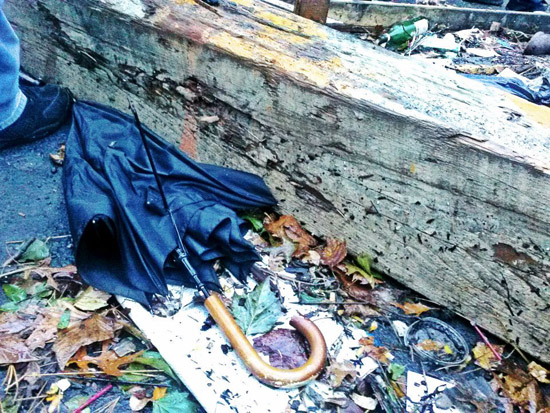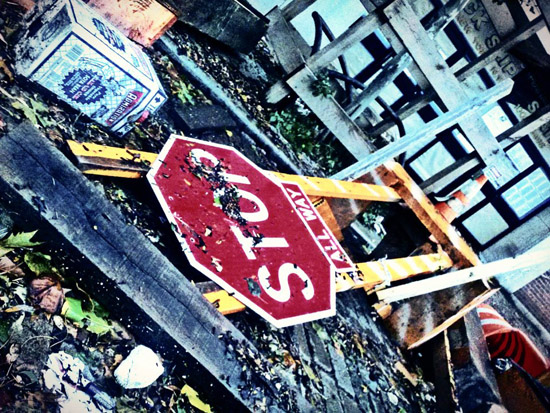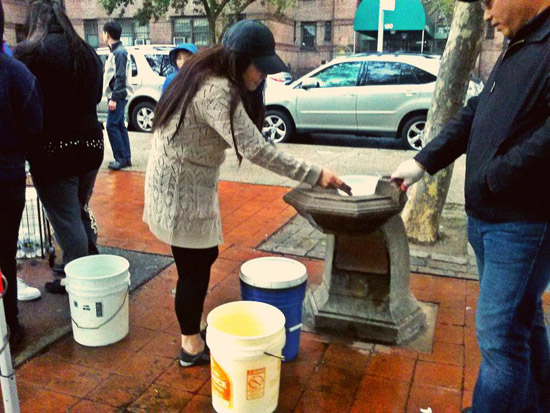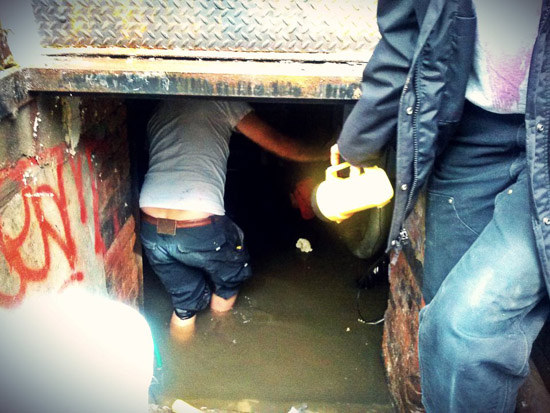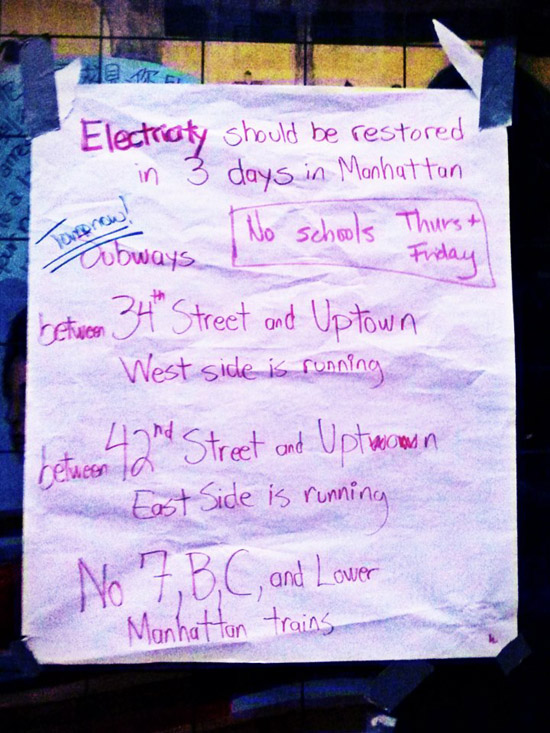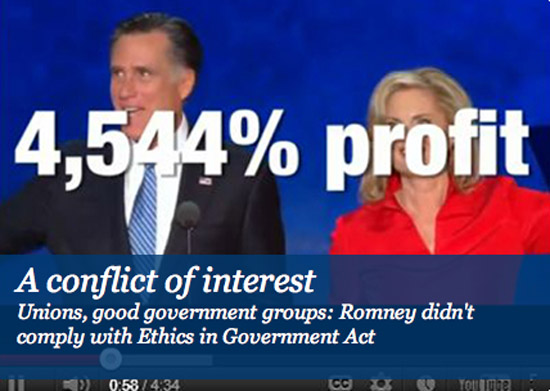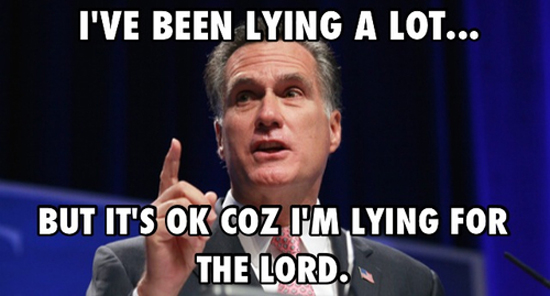
Tactical Animal: End of the Line1
Posted In Blog,Politics
by ChrisSick
“The ugly fallout from the American Dream has been coming down on us at a pretty consistent rate since Sitting Bull’s time — and the only real difference now, with Election Day ’72 only a few weeks away, is that we seem to be on the verge of ratifying the fallout and forgetting the Dream itself.”
— Hunter S. Thompson, Fear & Loathing on the Campaign Trail ’72
By the time you read this, if I’ve done my job correctly — and there is little guarantee of that — the polls will already be opening on the East Coast. This endless election is almost over. I’ve only been writing about it, with varying degrees of regularity, since the end of August and I’m exhausted. I have new pity for the professionals who have been writing about this horror show we call an election since May of last year, when the evolutionary throwbacks who made up the Republican Primary contenders first stood tall on a stage in South Carolina, looking more like a well-dressed police line-up than candidates for leadership of this struggling superpower.
To attempt to summarize the strange odyssey of the last four years in under 2,000 words would be an impossible task, and more befitting some grizzled pro journalist ready to sellout from grind of print and into the bright lights of book-length reporting and television appearances than this humble column. That said, looking back I can think of at least three points worth making before we’ve collectively settled (in every sense of the word) who should be the next President:
Point 1: We had it right before we had it wrong, but mostly we are Wrong
In my first Tactical Animal column I wrote:
“Overall, it looked like the President would eek out a largely meaningless win without an electoral mandate and go on to see his second term as stymied by Republican opposition in Congress as the later half of his first has been.”
The conventional wisdom — ahead of the selection of Paul Ryan as Republican Veep — was that the election was going to come down to a narrow win for Obama that would leave him with a weaker electoral mandate and a less cooperative Congress than he began his first term with nearly four years ago. The conventional wisdom in the last days before the election is exactly the same.
The last two to three months since Romney secured the nomination and the race began in earnest have featured myriad ups and downs for both candidates. By the end of September Romney had racked up an impressive series of gaffes, a meandering and largely uninspiring convention, three or four campaign reboots, and a leaked video about how he loves America despite hating nearly half of all Americans. The conventional wisdom then was best surmised by a headline I, and others, ran with declaring that Mitt Romney would never be President.
Then, of course, came the first debate, in which an energetic and forceful Romney hammered a sleepytime-tea Obama. There was much liberal gnashing of teeth and movement of prediction markets. The media narrative of a shambling and useless Romney campaign that had no hope in hell of mounting a serious electoral challenge was discarded in favor of asking if Obama was even trying to win this election.
Just typing that is reminding me of the whiplash feeling I had closely watching the events unfold. But, a month after the Obama crater, we’re back to Intrade predicting a 65% chance for him to win, and Nate Silver going even better predicting an 85% chance for an Obama victory. We’re literally right back where we started, with Obama looking to win by less than two points, but for sure looking to win.
All of the gnashing of teeth, wringing of hands, and general calamitous reactions to every little news story, gaffe, comment, interview, debate, commercial, or event is, really, meaningless. Six months ago it looked like the President was going to beat Mitt Romney by a small margin and that Democrats would narrowly hold the Senate, while Republicans continued to hold the House. Today it looks exactly the same.
Everything between reaching that conclusions six months ago and that conclusion today was almost entirely in service of attracting viewers, clicks, and readers to SELL YOU SHIT. It was all just politics-as-entertainment, and taking part in it has lead me to conclude that I’d be much happier (and most likely more useful) writing about real, actual policy than about the tactics used to get you to buy into a political brand. I have no idea how full time political writers do this without massive amounts of heroin, but the truth is most likely they just have no souls.
Point 2: Whomever wins, cheated
Several times over the last week, I’ve been asked if the President is going to win reelection, mostly by close friends and passing acquaintances, in slightly panicked tones. Mostly my response has been, “How the hell would I know? What do I look like, Nate Silver?” Then I recall that I write this column and am generally acknowledged as Knowing Things about politics, so I gently but firmly reassure them that yes, the President is going to be reelected, and they can stop worrying or start, depending on the political affiliation.
Typically, I’m never asked how I know. Because people, frankly, aren’t much interested in minutia. They want to be comforted, generally, and they want to be Right. Luckily, there’s an entire industry that exists just to do that! It’s called Right Wing Media. So when you wonder how I know, with a large degree of certitude, that the President is going to get reelected, I can helpfully point you to a Fox News story already claiming that massive election fraud is underway.
Although the story in question is related to electronic voting machines in Ohio, the implication is clear. If Obama wins this election, it will be due to a subversion of democracy, not an exercise of it by a populace that largely disagrees with the Right and doesn’t find Mitt Romney to be an appealing candidate. It can’t be that the electorate simply prefers Obama to Romney, at best it implies that Obama somehow duped the country with his big smile, and at worst it means Chicago-style election theft.
To me, and I’m sure many of my readers, these accusations sound utterly ridiculous. But to someone who’s convinced that Nate Silver is trying to game the election for Democrats, that a Romney landslide is coming, and that Democrats only win elections through fraud. And following those links as opposed to taking my word for it might be instructive if you’re wondering how people come to believe all of that:
“I, personally, absolutely believe [that the ‘Romney will win!’ theme] is a de-legitimizing strategy…One can expect legal challenges if the vote is close. I think this push to portray Obama as having zero chance is laying the groundwork. At minimum it works to keep constituents of Republicans in Congress from tolerating any compromises in the event of an Obama re-election because they will have a reinforced sense of being robbed (which they have had about Mr. Kenya his whole presidency)….”
—Reader email quoted by James Fallows, The Atlantic, 11/3/2012
The important takeaway here is that any and all attempts to “de-legitimize” the President are not new, and a smaller margin of victory on the sixth will only give them greater life. In 2008 Obama won by a margin of 7.2% of votes cast and 192 votes in the Electoral College. That didn’t stop the Right’s press and candidates from spending the last four years treating Obama as an illegitimate President. There’s many reasons for such a strategy, but if nothing else, it was vindicated when several Editorial Boards endorsed Mitt Romney because of the idea that Democrats in Congress would be more likely to work with a Romney administration than Republicans have with Obama.
But there is a cost to this. The strategy of stymieing the President for political gain may very nearly have worked this election cycle, and certainly was useful to the 2010 midterm-Tea-Party-takeover. But convincing somewhere between a third and half of the country that the President is illegitimate, and that their political opponents are immoral little fucksaws who care more about accumulating power than serving the citizenry is dangerous for reasons I shouldn’t really have to elucidate.
The Left, of course, worked most of the year to create their own counter-narrative about voter suppression through Voter ID laws. But, speaking of things that should be clear without further commentary, legitimate concerns about voter suppression amplified as an electoral tactic to motivate the base are a far cry from convincing the segment of the populace most fanatical about owning guns that their voting rights are being taken from them by electoral fraud on a massive scale. Which isn’t to say that the Left won’t play the same game as the Right if — somehow, despite all odds — Romney wins the Presidency. It’s just to say that some concerns originate from a more “reality-based” community than others.
Either way, when the voting ends, we can easily find ourselves in a situation where the campaign will not:
“So no matter who wins, the endless partisan arguments are going to continue. And hell, the campaign might continue for a while, too: There is also a chance that the winner of the popular vote loses the Electoral College this year, again, and if Obama ends up the Electoral College winner I bet Romney and the GOP don’t concede quite as politely as the Democrats did in 2000. If Romney wins the Electoral College but loses the popular vote, he will be our next president. In the unlikely event of an Electoral College tie, Romney will again probably be our next president. But we might get to keep Biden.”
—Alex Pareene, Salon, 10/23/2012
Final point: Democracy is beautiful
“Many forms of Government have been tried and will be tried in this world of sin and woe. No one pretends that democracy is perfect or all-wise. Indeed, it has been said that democracy is the worst form of government except all those other forms that have been tried from time to time.”
—Winston Churchill, between his eighth and ninth “lunch brandy”
All of the above points aside, forgetting all of the partisan bickering, and media narrative, and politics-as-bloodsport bullshit that I’ve spent the last two months writing about, if you’re reading this on the morning of November 6th and watching the news to see how this all shakes out, you’re watching a tremendous and beautiful moment in the history of human affairs.
Democracy is messy, ugly, and, at times, brutal. Our American version of it has many failings, from lacking a viable alternative to the two-party duopoly, to being vulnerable to fraud and abuse of the system, to the simple fact that we treat it not as a serious exercise in self-determination, but largely as a sporting match. But all those failings aside, in the long view, it’s a pretty incredible thing that every few years the citizenry of this country comes together to decide who their leader should be.
I wish I had more time and space here to address some of the imperfections we have and ways to improve it. Perhaps they’ll be more columns in the future, and those issues can and will be addressed. But the most important thing to remember today is that voting is a right and privilege, and people did and continue to die for those same rights of self-determination. It is a glorious thing to be allowed to step into a voting both and will my opinions into political action that determines the course of my country.
I hope you exercise that right today, regardless of whom you’re voting for. Personally, I plan to vote early, and spend the rest of the day watching the news and laying down as much action as I can before all the betting windows close.
God bless America.
Related Posts
Tactical Animal: The Beginning Of The End
Tactical Animal: Obama vs Romney 0.4 – Round II
Tactical Animal: An Autopsy And A Stratagem
Tactical Animal: Democrats, You Can Dry Your Cryin’ Eyes Now
Tactical Animal: Round One
Tactical Animal: Let The Presidential Debates Begin
Tactical Animal: On Politicking Cont…
Tactical Animal: On Politicking
Tactical Animal: Regarding The Pain Of Being Right…Or More Reasons Mitt Romney Will Never Be Your President
Tactical Animal: Have You Got Yourself The Belly For It?
Tactical Animal: Sorry Folks, Election’s Over, Donkey Out Front Shoulda Told Ya
Tactical Animal: Politics In The Post-Truth Era
Tactical Animal: Now We’ve Got Ourselves A Race





